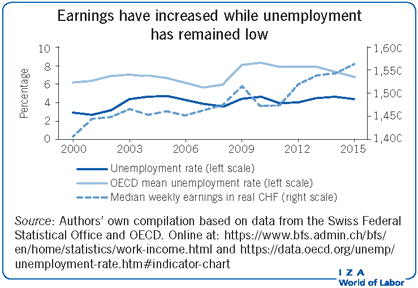Elevator pitch
Switzerland is a small country with rich cultural and geographic diversity. The Swiss unemployment rate is low, at only about half the OECD average. The rate has remained at that level since the year 2000, despite a massive increase in the foreign labor force, the Great Recession, and a currency appreciation shock, demonstrating the Swiss labor market’s impressive resiliency. However, challenges do exist, particularly related to earnings and employment gaps among foreign and native workers, as well as a narrowing but persistent gender pay gap. Additionally, regional differences in unemployment are significant.

Key findings
Pros
Unemployment has remained stable at a low level.
Wage inequality has remained low by international standards.
The labor market was only weakly affected by the recessions in 2001 and 2008 and recovered quickly.
There is no evidence that major events of the past 15 years—the eurozone crisis, the massive inflow of refugees, or the appreciation of the Swiss franc—negatively affected the labor market.
Real median earnings have increased by 11% since the year 2000.
Cons
Unemployment among foreigners is more than twice as high as among Swiss citizens.
The wage gap between Swiss citizens and foreigners remains high, especially among men.
The long-term unemployment rate has increased and remains higher than the OECD average.
The gender wage gap is narrowing, but only very slowly.
There are substantial regional differences in labor force participation and unemployment.